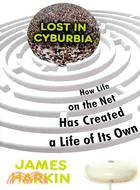圖書簡介The early twentieth century saw the slow but steady exodus of the population from inner cities to the suburbs. We are currently witnessing a similar transformation as our new century establishes itself, but in an entirely different realm. As new technologies proliferate — personal computers, the communication gadgetry of mobile devices and access to the internet — our culture is participating in a mass electronic migration. James Harkin christens this destination to “Cyburbia” — the ether of “online,” where we spend so much of our lives.
Once upon a time there were no text messaging, no e-mail and no social networking sites like Facebook, Bebo, Twitter and MySpace. The introduction of these new forums for communication has radically transformed the way that we live — and we can only guess what will come next. Innovative and extremely timely, Lost in Cyburbia describes the architecture of our digital life, how it has developed over the past seventy years and how it will evolve in the future. The narrative recounts how the theories of Norbert Weiner (the inventor of cybernetics) and Marshall McLuhan inspired the counterculture radicals in the sixties and seventies, and traces how their pioneering idealistic and theoretical work laid the groundwork for a system whose central idea is bringing about direct communication between peers, outside the reach of authority.
Harkin explores what it means to be in the loop — and our obsession with instant access to information and how it is shared over networks — and considers what has been lost and what has been gained. Are we more connected than ever before or more isolated? Have our thinking processes been forever altered? Is the democratic nature of the net slowly being eroded by corporate interests? Or, as once hoped, will the net enable the awakening of a new kind of global consciousness?












